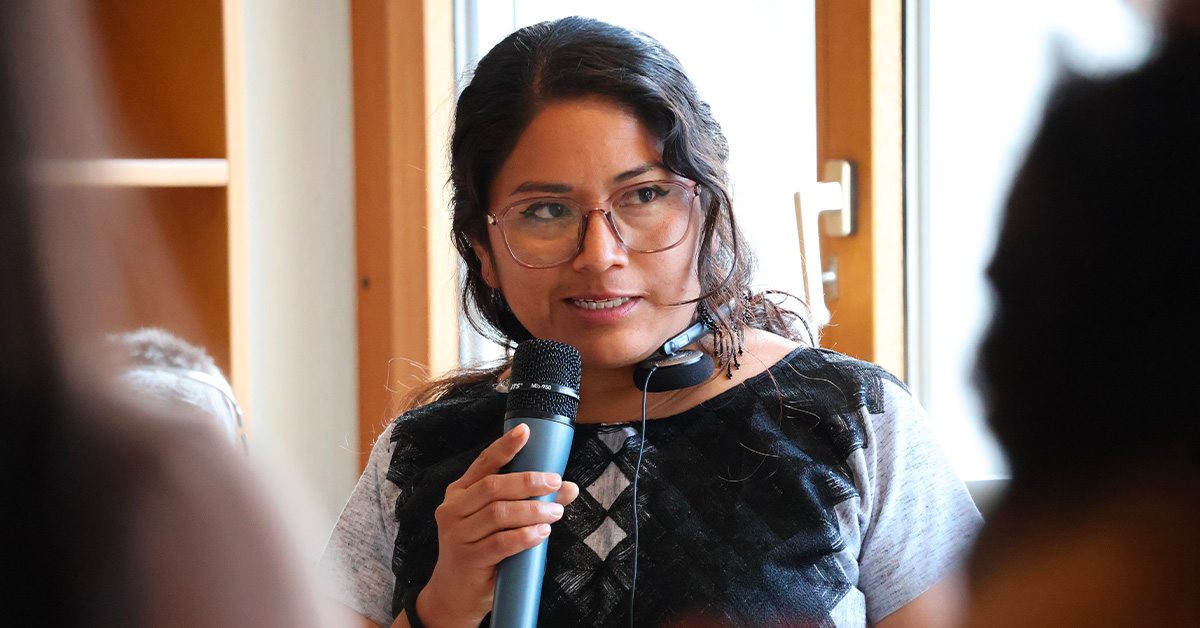ISHR: How would you introduce yourself?
Yuteita: ¡Kidan! My name is Yuteita Valeria Hoyos Ramos, I am an Indigenous Mixtec woman from Mexico. My town is called Santa Catarina Tlaltempan, [in the state of] Puebla. I am the General Coordinator of the Red Nacional de Abogadas Indígenas (RAI MX).
RAI is a network of women, legal professionals, originating from different Indigenous peoples of Mexico. We promote and defend the rights of girls and women, and Indigenous peoples, both in the legal sphere of the Mexican State, and from Indigenous justice systems, which exist and develop in community life.
ISHR: What inspired you to become involved in the defence of human rights?
Yuteita: I grew up in a family that practiced critical thinking. My father and mother are Indigenous, they grew up in adversity and precariousness. Through effort, they managed to become Indigenous education teachers. They taught – including my siblings and me – to develop critical thinking, not to be indifferent to injustices and always give of our work in favour of others.
I was raised in a town where the beautiful traditions of cooperation and mutual support are still preserved, where we love our land, music, language and traditions. But there are deficiencies in access to services such as health and education. My grandparents did not know how to read or write, they experienced racist violence, so did my parents. Seeing and feeling this pain of my ancestors and my neighbours, and feeling racism and discrimination firsthand, motivated me to commit myself ethically to my community, and to the rights of women and Indigenous peoples.
ISHR: What could Mexico and your community look like in a future where you would have achieved your objectives?
Yuteita: I long to see Mexico without racism, [to see it become a place where] people have the same access to human rights, but also the full freedom to live our traditional ways of life, where native languages are respected and encouraged, and where Mother Nature and the territories, our Indigenous identities and ways of life are respected.
It is impossible for me to see an ideal future, but I can see a process of improvement in the material conditions of the entire population, and mainly of those of us who have been historically impoverished, marginalised, excluded and discriminated against.
ISHR: Have you been the target of attacks or acts of reprisals because of your work as a defender?
Yuteita: Until recently, I considered that I was not in a risky situation, because I did not [face] what people who fight for human rights unfortunately experience daily and have come to normalise: constant attacks on social networks, attempts to discredit us in public spaces, diminishing and undermining our opinions, and worse still, inciting violence against us through hate speech.
That is precisely what I have experienced, and what I identify as something constant towards the members of RAI. It is regrettable how this can constitute a gateway to worse risks, including to our physical integrity, or lead to further damage to our mental and emotional stability. The latter, coupled with fatigue due to lack of self-care, are red flags that we must see and act on.
ISHR: Do you have a message for the UN and the international community?
Yuteita: Mexico is a multicultural country, immensely rich in biodiversity and with a great sense of cooperation in its Indigenous communities, but we are still immersed in a racist and colonial structure that is expressed in the exclusion of Indigenous people from decision-making and public opinion spaces.
The context in which we live remains a continuation of the colonialist project, as the State continues to deprive us not only of our lands and identity, but also encourages the extraction of our cultures, spiritual rituals, narratives, among others.
The Indigenous peoples of Mexico today find themselves divided by the ways in which the State has intervened in our forms of organisation, a fact that adds to the legal uncertainty posed by the Reform of the Judicial Branch; and that puts at risk the jurisprudential advances in favour of the rights of Indigenous peoples and their territories.
We call for international solidarity to monitor and spread awareness of all forms of oppression experienced by Indigenous, Afro-descendant and racialised peoples around the world, especially in Abya Yala [note: a Kuna language term used by Indigenous activists to refer to the Americas], and specifically in Mexico.
ISHR: Do you have a message for the new Mexican government?
Yuteita: We ask the new president of Mexico [Claudia Sheinbaum] to listen to the women and Indigenous peoples of Mexico, to listen to us from a diverse perspective, even those of us who have critical positions, and to engage in dialogue from an intercultural perspective, from substantive equality, and from anti-racism, and to do so by recognising the historical violence to which the Indigenous population and racialised people have been subjected.
Such a dialogue should allow us to put forward our worldviews, our feelings as peoples, the love and respect we have for our territories, for our identities. It should result in structural changes in the Mexican State, from the conceptual as well as the material, that is, from theoretical and epistemological conceptions, as well as from the budgetary matter.
We ask the new Congress to take a critical stance and, without fear of dissent, to develop in-depth debates on the reforms that are on the horizon, as well as on the regulatory laws: it has in its hands the political and legal direction of a country, including the Indigenous peoples of Mexico.
We ask that they propose necessary reforms, such as the protection of the territory of Indigenous and Afro-Mexican peoples and communities from extractive projects and others of the same type that have only generated violence and loss of identity and community organisations, which needless to say is not a coincidence.

